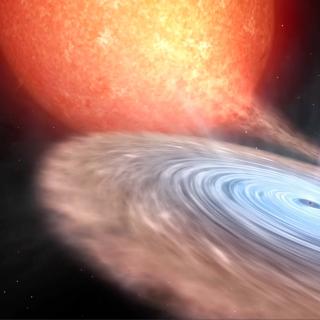Bibcode
Muñoz-Darias, T.; Torres, M. A. P.; Garcia, M. R.
Bibliographical reference
Monthly Notices of the Royal Astronomical Society, Volume 479, Issue 3, p.3987-3995
Advertised on:
9
2018
Citations
42
Refereed citations
36
Description
We present an optical spectroscopic study of the black hole X-ray
transient V4641 Sgr (=SAX J1819.3-2525) covering the 1999, 2002, and
2004 outbursts. The spectra were taken over 22 different epochs during
the low-luminosity phases that follow the sharp and bright outburst
peaks displayed by the system. The data reveal the frequent presence of
wind-related features in H (Balmer) and He I emission lines in the form
of P-Cygni profiles and strong emission lines with broad wings. The
terminal velocity of the wind, as measured in the blue-shifted
absorption (P-Cygni) components, is in the range of ˜ 900-1600 km
s-1 , while the broad emission line wings (so-called nebular
phases) imply outflow velocities of up to ˜3000 km s-1
. We show that, at least for several of the wind detections, the radio
jet was active and the system was likely in the hard state. This,
together with previous detections reported in the literature, shows that
V4641 Sgr is the second source of this class, after V404 Cyg, where the
presence of these cold wind outflows has been clearly established. We
discuss the similar phenomenology observed in both systems as well as
the possible nature of the outflow and its impact on the accretion
process.
Related projects

Black holes, neutron stars, white dwarfs and their local environment
Accreting black-holes and neutron stars in X-ray binaries provide an ideal laboratory for exploring the physics of compact objects, yielding not only confirmation of the existence of stellar mass black holes via dynamical mass measurements, but also the best opportunity for probing high-gravity environments and the physics of accretion; the most
Montserrat
Armas Padilla